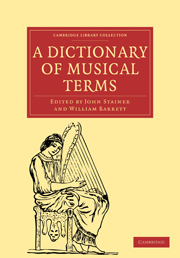P
Published online by Cambridge University Press: 10 November 2010
Summary
P. Abbreviation of piano, soft.
Paduana, Padouana. [Pavan.]
Pæan, παιάv. The ancient choral song addressed to Apollo, named after its burden, ιώ παιάv. It was sung sometimes before battle, and sometimes after a victory. Donaldson thinks it probable that it was at first accompanied on the phorminx, which, however, was afterwards superseded by the flute. From the ancient Paean sprang the gymnopcedic, pyrrhic, and hyporchematic dances.
Pæon. A foot consisting of one long syllable and three short. The position of the long syllable can be varied in four ways, hence the Pæon is said to be primus, secundus, tertius, or quartus. [Metre.]
Pair of Organs. The word pair simply means a set, and it is used in this sense in the expression a “pair of stairs,” or a “pair of scissors.” It was formerly in more general use than now, and “pair of cards,” and “pair of beads,” are met with in the old poets. A “pair of organs” means, then, an organ having a complete set of pipes.
Palalaika. [Balalaika.]
Palco (It.)The stage of a theatre, &c.
Palilia. The rustic dance at the Festival of Pales, in which the shepherds leapt round and over burning straw. It may have been to some extent the origin of the May-pole dance.
- Type
- Chapter
- Information
- A Dictionary of Musical Terms , pp. 342 - 371Publisher: Cambridge University PressPrint publication year: 2009First published in: 1876



